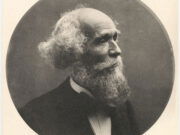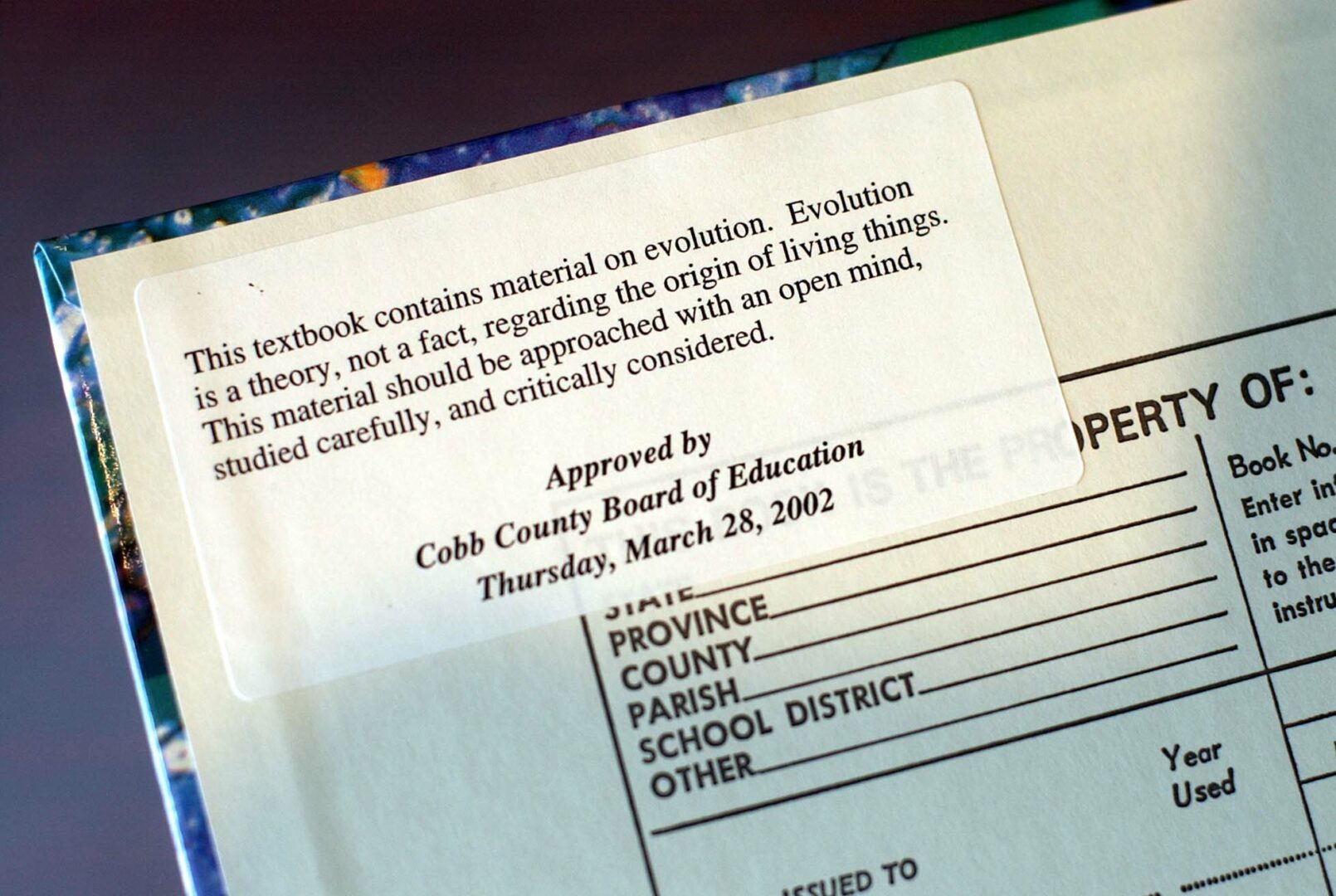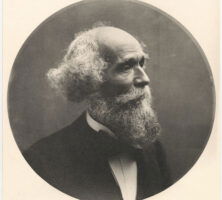The theory of evolution was developed by the English naturalist Charles Darwin in 1859 as a scientific explanation of the phenomenon of species formation. With later modifications, it is accepted as valid by most scientists, despite some disagreements over the processes involved. Strongly opposed by a considerable number of people, however, the theory continues to arouse debate. As elsewhere in the United States, responses to Darwin’s theory in Georgia have varied from full acceptance to strenuous opposition.
Early Theories of Evolution
Although Darwin’s explanation of speciation, or the development of new species, has elicited the greatest controversy, it was not the first theory of evolution proposed. Of the earlier theories of evolution, the most thorough was articulated in 1809 by the French naturalist Jean Baptiste Lamarck, who contended that over long periods of time species can undergo organic modifications in response to environmental conditions. Such modifications, or acquired traits, he argued, are passed on to the offspring of the altered organism, resulting ultimately in a complete transmutation of form.
Lamarck’s theory received limited attention for many years, but it assumed greater significance after the publication of Darwin’s On the Origin of Species by Means of Natural Selection in 1859. In nature, reasoned Darwin, species compete for resources, or struggle for existence, and those with traits that undergo variations favorable to adaptation to their environment survive and perpetuate themselves. Over time these variations result in the formation of new species. Darwin later agreed that environmental factors could induce alterations in species, but he viewed natural selection as the primary agent of evolution. Although many American scientists and other intellectuals found the Lamarckian view to be more compatible with their Christian beliefs, they often identified themselves as followers of Darwin and honored him for the comprehensive quality of his theory and for drawing new attention to evolution. Eventually, scientists demonstrated that the Lamarckian theory was flawed, and in light of a growing body of evidence, most of them concluded that Darwin’s ideas were essentially correct and provided a sound, unifying explanation of biological facts.
The Teaching of Evolution in Georgia Universities in the Nineteenth Century
Within two decades after the publication of Origin, an impressive number of American scientists, theologians, and other intellectuals had come to accept the theory of evolution. Among them were several Georgians, including Henry Clay White, from 1872 to 1927 a professor of chemistry at the University of Georgia in Athens. An avowed evolutionist by the mid-1870s, White taught the theory to his students throughout his long career. Equally committed to the theory was John Pendleton Campbell, the first professor of biology at the University of Georgia. Campbell freely advocated evolution during his entire tenure at the university (1888-1918) and, along with White, sponsored a conference in Athens in 1909 in celebration of the centenary of the birth of Darwin. Among those presenting papers at the conference were other university professors and C. K. Nelson, bishop of the Episcopal Diocese of Atlanta. Nelson’s paper in praise of Darwin was printed in the Athens Weekly Banner. It is likely that a large number of Georgians deplored the ideas presented at the conference, but they made no concerted effort to counter them.
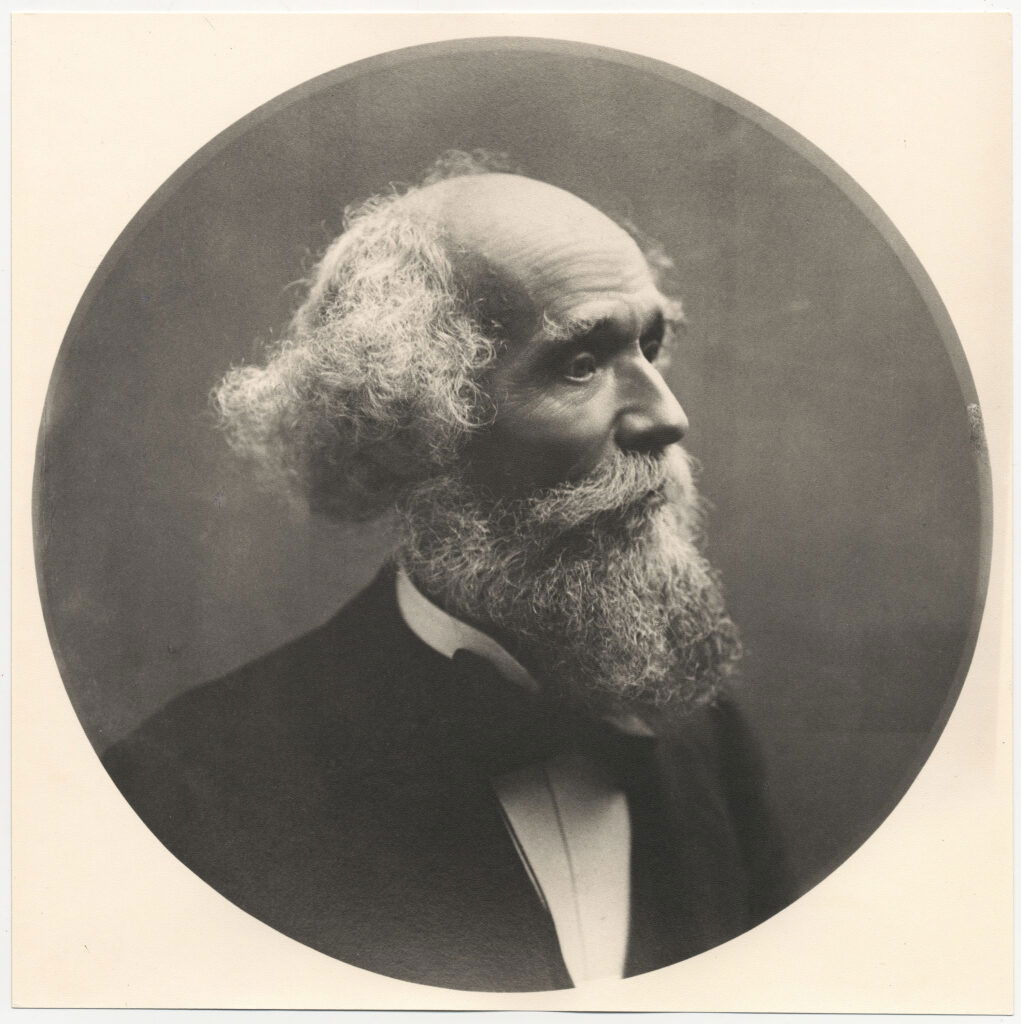
Courtesy of Hargrett Rare Book and Manuscript Library, University of Georgia Libraries.
Even better known as a proponent of evolution was Joseph LeConte, a native Georgian whose book Evolution and Its Relation to Religious Thought (1888), became one of the most popular works on the subject. Arguing for what he called theistic evolution, LeConte received great recognition for his efforts to reconcile evolution with Christian teachings. Although he was then at the University of California at Berkeley, LeConte maintained strong ties with Georgia and the South in general. His advocacy of evolution seems to have had no noticeably adverse effect on his reputation in his native region.
Opposition to Evolution in the Early Twentieth Century
As the Christian fundamentalist movement emerged early in the twentieth century and began to flourish during World War I (1917-18), however, opponents of evolution voiced their dissent more vigorously and by the 1920s were staunchly protesting the teaching of the theory. This was the case not only in Georgia but also elsewhere in the United States, though more prominently in the South. The champion of the antievolutionist movement was the noted American statesman William Jennings Bryan, who in an address before the Georgia General Assembly in July 1923, urged the legislators to enact an antievolution statute. A bill to that effect came before the General Assembly in 1924, but it failed to pass. Among those opposing the measure were the Georgia Academy of Science and the Columbus Enquirer-Sun, owned by Julian and Julia Collier Harris, who identified themselves as theistic evolutionists. Another antievolution bill was introduced in the General Assembly in 1925, but it also failed to win the support of a majority of the legislators. Meanwhile, in 1924, the trustees of Mercer University, a Baptist institution located in Macon, had suspended biology professor Henry Fox for espousing evolution.
During the 1920s, especially after the famous Scopes trial in Tennessee in 1925, several states proposed legislation to outlaw the teaching of human evolution. Although only a few antievolution laws were in effect at the end of the decade, the foes of evolution, including those in Georgia, had lost none of their zeal for dismissing Darwinism from the school curriculum. For example, in 1926 the Atlanta Board of Education placed a ban on teaching the theory in its schools, though it reversed itself soon thereafter in response to a threatened legal challenge. Antievolution rhetoric remained strong, and some of Georgia’s leading citizens issued uncompromising denunciations of the Darwinian theory. Among them was the former evolutionist Marion McHenry Hull, an Atlanta physician who published a popular antievolution address in the mid-1920s. Hull declared that Darwin’s theory represented mere speculation and called it “destructive” to Christian views.
The Mid-Twentieth Century
This vigorous censure of evolution did not deter some Georgians from advocating the theory, however. For example, from 1914 to 1938, James Coffee Harris, a longtime superintendent of public schools in Georgia and later director of the state school for the deaf, published at least two dozen works designed to explain and promote evolution. A careful student of the Darwinian theory, Harris called it a “great discovery” and viewed the evolutionary process as “the will of an everlasting God.”
By the 1930s, while scientific advances were resulting in reaffirmation of Darwin’s theory, the antievolution movement had become relatively quiet. Its influence was manifest, however, in high school biology textbooks, which, in general, either downplayed or omitted discussion of Darwinism. During the 1950s the movement began to experience a nationwide resurgence and waxed strong in Georgia. Between 1973 and 1982 Georgia opponents of evolution, mostly supporters of one or another of the various schools of creationism, focused on enacting laws to diminish what they perceived as an increasing influence of the theory in the state’s public schools, and they supported several bills before the Georgia General Assembly requiring equal time for teaching the biblically based notion of creation, or later, for a view called creation science.
After these proposed measures failed to pass, a number of Georgia creationists began to concentrate their efforts at the local level. Meanwhile, during the 1970s antievolutionists welcomed the support of Braswell Deen Jr., a Georgia Court of Appeals justice. In 1974 Deen began to teach an antievolution course in the evening program of Oglethorpe University, but the science faculty protested the arrangement and succeeded in bringing it to an end. Vehemently critical of the theory of evolution, Deen asserted in 1979 that the “monkey mythology of Darwin” was the direct cause of myriad social ills and criminal acts.
Despite U.S. Supreme Court rulings against antievolution statutes, several communities continued their efforts to suppress the teaching of the theory of evolution, or at least to give equal time to a view generally known as scientific creationism. Similarly, a parallel movement, which included some scientists, was advocating equal time for consideration of the notion of intelligent design as the explanation for natural phenomena. Aligned with the argument presented in 1802 by William Paley, in his book Natural Theology, members of this group believed in the basic fixity of species, contended that the complex nature of the universe denotes design by a supreme being, and denied that evolution is a sustainable theory.
Challenges to Evolution at the Turn of the Twenty-first Century
A proposal to provide local school boards with the authority to “establish optional courses in creationism” failed to pass in the Georgia General Assembly of 1996, but efforts to counter the theory of evolution persisted in some areas. In 2002, for example, the Cobb County Board of Education voted to place a statement in science textbooks asserting that Darwin’s theory should be treated as an opinion, not as fact, and soon thereafter authorized classroom consideration of views contrary to evolutionism. This action attracted widespread attention. Among those objecting to the disclaimer was the National Academy of Sciences, which noted the aggregate of scientific evidence affirming the basic validity of the Darwinian theory and urged the board to remove the statement from the textbooks. Expressing support of the Cobb County decisions was a group of twenty-eight Georgia scientists, calling themselves the Georgia Scientists for Academic Freedom. Mostly, but not exclusively, specialists in fields other than biology and geology, this group voiced skepticism of the evidence for evolution and stated that the theory fails to account for the complex nature of life. In the meantime, some dissenting parents initiated a lawsuit to force removal of the disclaimer, and a federal judge ruled in April 2004 that the issue must go to trial.
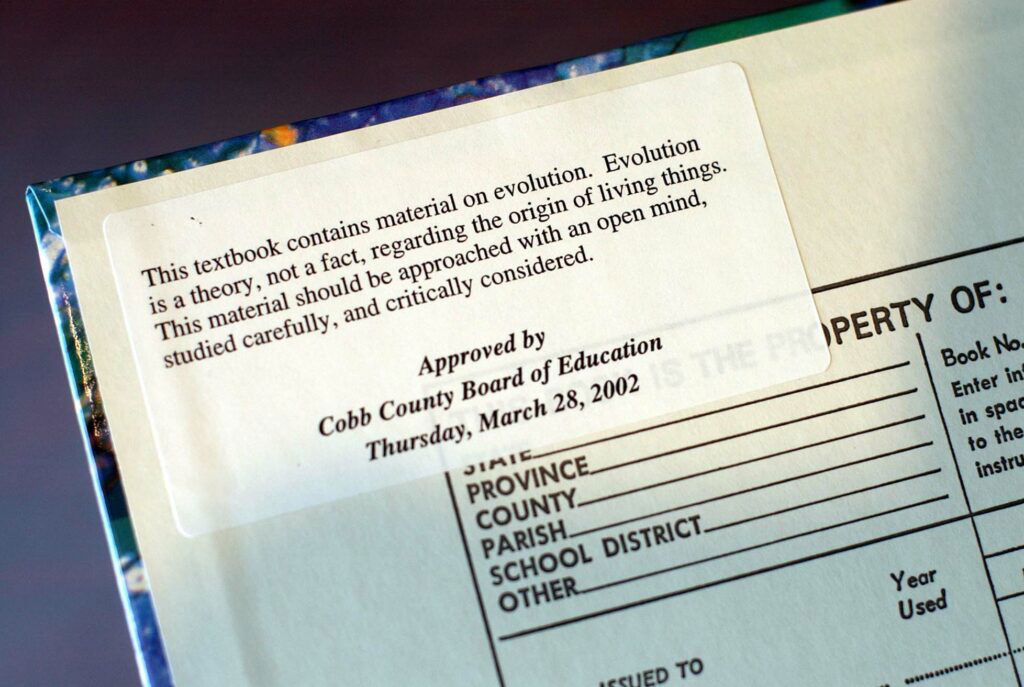
Courtesy of Atlanta Journal-Constitution.
Through 2003 antievolution influence was also evident in the state-established criteria for instruction in the introductory high school biology course, for only three of the eighty-one guidelines pertained to evolution, and the mandatory test for graduation from a Georgia secondary school contained no questions regarding the theory. New guidelines, or Georgia Performance Standards, were introduced early in 2004, however, and following American Association for the Advancement of Science criteria and recommendations of the Biology Academic Advisory Committee of the University System of Georgia, they included a major section on evolution. State Superintendent of Schools Kathy Cox initially removed most of that section and elsewhere substituted the phrase “biological changes over time” to replace the word evolution. In addition, she stated that “intelligent design” is a scientific theory that deserves consideration in biology classes. Opposition by several state leaders, the state Board of Education, scientists, and others who viewed the deletions as signs of retarding efforts to improve education in Georgia quickly prompted the superintendent to restore the word evolution to the guidelines. Soon thereafter, the state Board of Education voiced its support of the original proposal containing the section on the theory of evolution, and approved the guidelines on July 8, 2004.
Along with numerous letters, opinion columns, and editorials in the Atlanta Journal-Constitution early in the twenty-first century, these recent events indicate that the theory of evolution continues to arouse attention in Georgia. To most biologists, however, the theory rests on substantial evidence, offers a valid scientific explanation that unifies facts and findings in their field, and satisfies the tests applied to all scientific theories, most of which are now commonly accepted as operational explications of natural and physical phenomena.


